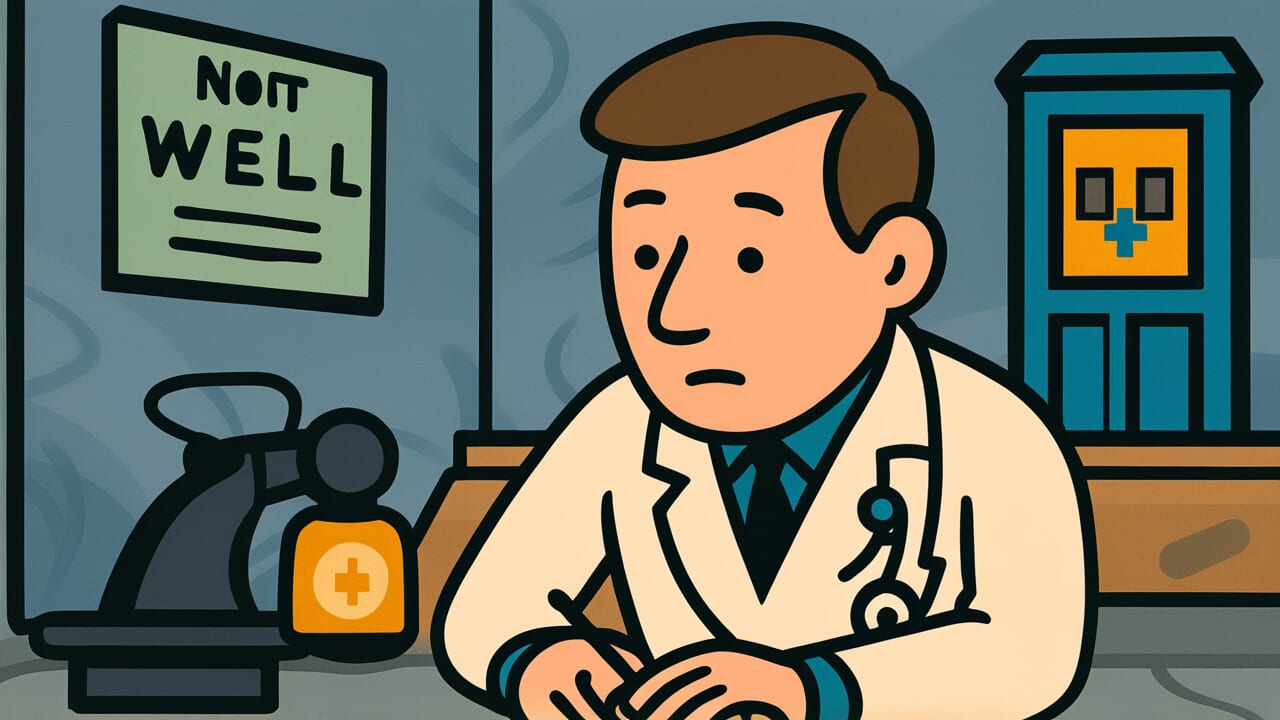How to Read “The doctor’s neglect of health”
Isha no fuyōjō
Meaning of “The doctor’s neglect of health”
“The doctor’s neglect of health” means giving good advice to others but not following it yourself. The expression comes from doctors who recommend healthy living to their patients while living unhealthy lives themselves.
This proverb points out the contradiction when experts or leaders are lenient with themselves and don’t follow their own teachings. For example, a doctor who smokes while telling patients to quit, or a teacher who misses deadlines while preaching time management.
Even today, people widely understand this expression. It’s commonly used to point out self-contradiction. People often use it with light sarcasm or self-deprecation when experts or leaders don’t match their words with actions.
The phrase captures a fundamental human truth. There’s a huge gap between knowing something and actually doing it.
Origin and Etymology
The exact origin of this proverb isn’t clear from historical documents. However, people likely used it widely during the Edo period. The proverb emerged as the medical profession became established and healthcare reached ordinary people.
“Fuyōjō” means neglecting your health and continuing bad lifestyle habits. Doctors advise patients to live regularly, exercise moderately, and eat balanced meals. Yet the doctors themselves worked late into the night, ate irregularly, and didn’t exercise. This ironic sight struck people as particularly noteworthy.
Edo period doctors were especially busy making house calls. They often had no time for their own health management. They told patients “go to bed early” while staying up late reading medical books themselves.
People who saw these doctors began using this proverb to describe contradictory human nature. The expression brilliantly captures a universal human weakness. Even experts struggle to practice what they know when it comes to themselves.
Interesting Facts
Medical research shows that doctors’ own health management affects their persuasiveness with patients. One survey found that weight loss advice from doctors who maintain normal weight has higher patient compliance rates. In other words, “the doctor’s neglect of health” can actually reduce medical effectiveness.
This proverb applies beyond doctors to many professions. Japan has several proverbs with the same structure. “The dyer’s white hakama” and “the carpenter’s rickety shack” both express how experts put their own needs last.
Usage Examples
- My nutritionist friend always eats convenience store lunches—talk about the doctor’s neglect of health!
- I wrote a book on saving money but I’m in debt—truly the doctor’s neglect of health.
Universal Wisdom
“The doctor’s neglect of health” teaches us about the deep gap between knowledge and action. Humans are strange creatures. We often know what’s right but can’t do it.
Why does this contradiction happen? Because completely different psychology works when we advise others versus when we act ourselves. Other people’s problems look objective. We can analyze them calmly and suggest ideal solutions.
But with our own issues, emotions get in the way. We’re tired, busy, just this once won’t hurt, we’ll start tomorrow. Excuses keep bubbling up, and we postpone what we know is right.
This proverb has survived hundreds of years because this contradiction reflects fundamental human weakness. No one is perfect. Even experts and leaders suddenly struggle when managing themselves.
Our ancestors expressed this universal truth through the familiar figure of the doctor.
Yet this proverb also feels warm. It contains tolerance that forgives our imperfection and accepts our humanity. It speaks to everyone struggling with the gap between ideal and reality, saying you’re not alone.
When AI Hears This
The human brain doesn’t discount value over time at a constant rate. It discounts the near future steeply and the distant future gradually. This is called hyperbolic discounting.
For example, people choose 110,000 yen in 13 months over 100,000 yen in 12 months. But they choose 100,000 yen today over 110,000 yen in one month. Mathematically it’s the same choice, yet the decision flips when it’s immediate.
When doctors advise patients about exercise or diet, they view another person’s life timeline objectively. They can weigh ten-year heart disease risk against today’s ramen and give rational advice.
But with themselves, the immediate pain of exhaustion after a night shift overwhelms the abstract benefit of future health. It’s not about knowledge. The time-discount curve becomes extremely warped when it’s your own problem.
What’s interesting is the dual nature of the medical profession. Doctors understand statistically that “smokers have X times higher lung cancer risk.” Yet behavioral economics experiments show that understanding probabilistic risk and actual behavioral choices are processed by separate systems.
Doctors know intellectually, but their brain’s reward system responds strongly to immediate pleasure. It’s ironic evidence of human decision-making system limits. Expert knowledge can’t overcome the power of present bias.
Lessons for Today
“The doctor’s neglect of health” teaches modern people the importance of treating ourselves with the same kindness and strictness we show others.
When you advise someone, you’re surely thinking of them and sharing the best approach. But are you directing that advice to yourself too? Do you tell others “don’t overdo it” while working yourself to the limit?
Do you tell friends “take care of yourself” while putting your own care last?
This proverb doesn’t demand perfection. Rather, it teaches the value of noticing your own contradictions. Awareness is the first step toward change.
Reflecting on what you recommend to others reveals what you truly need yourself.
You can start something today. When you advise someone, ask yourself the same question. Small steps are enough. Matching words and actions is hard, but you can begin walking in that direction.
You deserve to be cared for just as much as the people you care about.



Comments